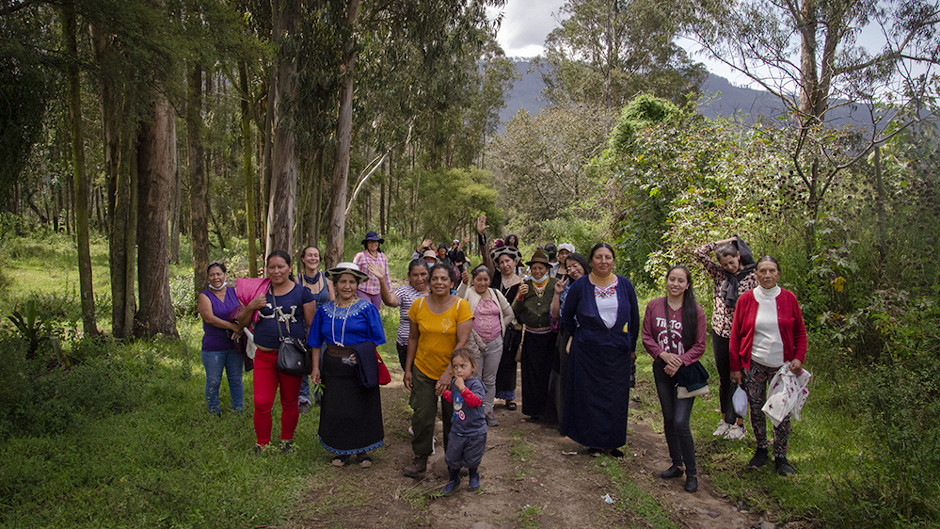On November 15, 2021, the United Nations Committee on the Elimination of Discrimination Against Women issued significant recommendations to the government of Ecuador on how it can realize its human rights obligations vis-à-vis rural and Indigenous women.
“These recommendations, which focus on the collective rights of Indigenous women, the right to free, prior and informed consent in relation to development projects affecting ancestral lands, and the rights of rural women to natural and productive resources to engage in agricultural work, are the culmination of long-standing support by the Miami Law Human Rights Clinic to rural and Indigenous women in the region,” said HRC Practitioner-in-Residence, Denisse Córdova Montes.
In Fall 2020, past HRC students Abril Montero Dokser and Bryan Percy supported FIAN Ecuador, Unión Tierra y Vida, and various groups that form the Red de Mujeres Rurales in Ecuador to advance the rights of rural and Indigenous women in Ecuador.
Using a feminist guide titled “Cooking Up Political Agendas” developed in 2019 and 2020 by the HRC in collaboration with organizations of rural, Indigenous, and peasant women, human rights defenders, and FIAN International, the HRC led consultations with groups in Ecuador via Zoom in the middle of the COVID-19 pandemic. Months of consultations resulted in the creation of a human rights report centered on the rights to food, education, health, political participation, and rights of nature of rural and Indigenous women.
The report was utilized in local advocacy efforts in Ecuador to spread awareness of human rights violations and recommendations for the advancement of rural and Indigenous women’s rights. In October 2021, the HRC together with FIAN Ecuador and the Red de Mujeres Rurales submitted a shadow report based on the human rights report to the UN CEDAW Committee for their tenth periodic review of Ecuador at the Committee’s 80th session.
As part of the UN CEDAW Committee’s review of Ecuador, HRC fellow Montero Dokser and current HRC student Laura Leira participated in a lunch briefing with the members of the UN CEDAW Committee on October 28, 2021. At the briefing, local Ecuadorian organizations presented oral declarations and answered questions by the CEDAW Committee members. “These tremendous activists have been working for years on behalf of their communities. To be able to support them in their advocacy in an international forum was a formative experience,” Leira said.
At the end of the review, the committee issued concluding observations to the government of Ecuador. The observations point out inequities in Ecuadorian law and life and provide recommendations in subjects such as discrimination, gender-based violence, political participation, education, employment, health, climate change, rural women, and Indigenous women. The observations include recommendations that are in direct response to our joint submission to the UN Committee. These included recommendations to adopt legislation to protect the collective rights of Indigenous women to their lands, require free, prior and informed consent for projects affecting traditional lands, funding agricultural activities, loans, and credits for farming, and providing services such as accessible education and health care.
The work with rural and Indigenous women in Ecuador is part of the HRC’s regional work on the topic. In the spring of 2021, HRC students Montero Dokser, Percy, and Yanitza Sanchez participated in similar efforts in Guatemala resulting in a human rights report on the rights of rural and Indigenous women in Guatemala. The report was a result of collaboration between the HRC, Campaña Guatemala Sin Hambre, Asociación Colectiva Poder y Desarrollo (CPDL), Fundación Tierra Nuestra, Asociación Movimiento por la Paz, Asociación de Mujeres Luqueñas para el Desarrollo Integral, and the University of Oviedo Clinic in Spain. The report focused on the rights to food and food sovereignty, political participation, freedom from violence, access to justice, and the rights of women human rights defenders.
Guatemalan partners have disseminated this report for local advocacy and launched it at a virtual interactive dialogue on September 22, 2021, to discuss its development and recommendations. Montero Dokser represented the HRC at the virtual launch. Advocacy efforts will continue both locally and internationally as this report could be adapted for submission to UN expert bodies; in fact, a submission to the UN CEDAW Committee is already in the works.
“The HRC afforded me the opportunity to learn about rural and Indigenous women’s rights directly from women in the affected communities. It was an honor to spend time getting to know our partners and local women in Ecuador and Guatemala who work every day to advance their rights,” said Montero Dokser.
Read more about Miami Law’s Human Rights Clinic

